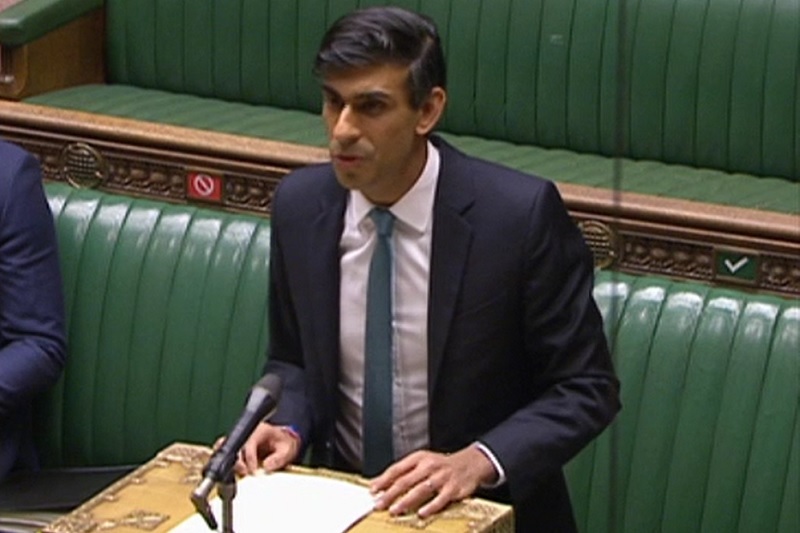Spending Review 2020: responses from the sector
Organisations from across the housing sector have been responding to today’s one-year Spending Review, which included announcements concerning infrastructure spending and homelessness.

Today’s one-year Spending Review was fairly quiet in terms of housing, but several announcements were made relating to a new “Levelling Up Fund”, as well as additional funding for homelessness and a £7.1bn National Home Building Fund.
Inside Housing has brought together the responses from some of the sector’s leading figures and bodies.
Kate Henderson, chief executive, National Housing Federation
“The government’s focus on housebuilding and levelling-up came through strongly in today’s Spending Review. The £7.1bn National Home Building Fund, alongside the £12bn announced through the Affordable Homes Programme, will help reduce the current shortfall of four million homes, as well as stimulate the economy and create local jobs. It’s also encouraging to see new money for retrofitting social homes, which is vital to helping us achieve our environmental targets.
“We welcome additional investment to help reduce rough sleeping and the commitment that housing benefit will remain at current rates, ensuring people on low incomes can better afford private rents. However, we are concerned that there is still no confirmation that the £20 a week top-up for Universal Credit will continue past March, as many depend on this income.
“Whilst funding for the Building Safety Regulator is welcome, it is disappointing that the government has not taken this opportunity to provide upfront funding for the removal of cladding to ensure that buildings can be made safe as quickly as possible.”
Melanie Rees, head of policy and external affairs, Chartered Institute of Housing
“It’s positive to see an additional £151m allocated to help end rough sleeping and prevent homelessness in England, in the chancellor’s Spending Review.
“What we urgently need to see is investment for 90,000 new homes at social rents each year, realistic help with housing costs for those who need it and good quality housing support services. Investing in new social rented homes would not only help to address homelessness and meet housing need, it would also boost the economy and create much-needed jobs. We will continue to make the case for this to government.”
Tracy Harrison, chief executive, Northern Housing Consortium
“The levelling-up fund is important for the North because historically, the region has been excluded from accessing the lion’s share of some big funding pots.
“However, this competitive bidding fund, limited to projects of £20m, will need to be aligned with Green Book reform and mainstream investments such as the Shared Prosperity Fund and National Home Building Fund, if it’s to result in the step-change we all want to see.”
Mark Perry, chief executive, Vivid
“The announcement of £250m to help end rough sleeping, a £4bn fund for local projects to help communities become ‘stronger, healthier and happier’, as well as a £7.1bn National Home Building Fund, is very welcome news.
“Everyone needs and has a right to a safe and secure place to call home. And we also recognise that the home is more than the four walls we live in, which is why we’re pleased to hear about investment in placemaking and building communities, essential for improved well-being and a brighter future.”
Nicholas Harris, chief executive, Stonewater
“This one-year Spending Review for 2021/22 was always going to focus on managing the response to and emergence from the COVID-19 pandemic. Although more tough spending decisions undoubtedly lie ahead, we urge the chancellor to continue his focus on ‘building back better’ and the key role affordable house building can play in helping families recover, while creating jobs and levelling-up across all of the economy.
“At Stonewater, we are committed to creating pathways into sustainable homeownership. We strongly welcome the confirmation of the £12.2bn Affordable Homes Programme funding for 2021-26 and the £7.1bn National Home Building Fund that will be focused mainly on crucial infrastructure. This longer-term certainty allows us to increase our housebuilding pipeline, delivering thousands of homes that provide the right support at the right time. These span social rent right through to shared ownership as we help people through the pandemic and tackle the housing crisis.”
Lee Bloomfield, chief executive, Manningham Housing Association (MHA)
“It was striking to hear the chancellor warn that UK unemployment is expected to rise to 2.6 million by the middle of next year.
“I fear that areas such as Bradford and Keighley, where MHA owns and manages more than 1,400 homes for around 6,000 residents, will be particularly vulnerable to further redundancies
“We need cast-iron guarantees of targeted government assistance for those who have lost their jobs or are likely to do so, many of whom are of black and minority ethnic origin and have already been disproportionately impacted by the pandemic.
“People from across these communities want to play their full part in the economic recovery that everyone hopes will lie ahead and no neighborhood should be left behind.
“The £4bn Levelling Up Fund is to be welcomed, but this money must be fairly and openly allocated on the basis of genuine local need, not as a means of further benefiting parts of the country that are already well resourced.
“Some of this money could support the construction of more affordable homes including larger family properties, the lack of which has had hugely damaging health effects on those forced to live in overcrowded conditions.
“Community-based organisations such as MHA stand ready to work with the government to offer guidance on where we believe the new spending commitments can deliver the most positive results.”
James Jamieson, chair, Local Government Association
“Council services have been critical in the fight against COVID-19, protecting the most vulnerable, supporting our local businesses and keeping the country running. It is good that today’s Spending Review provides a potential increase of 4.5% in council core spending power to support these vital local services. However, this assumes council tax bills will rise by 5% next year, which will place a significant burden on households.
“It is good that the chancellor has provided further funding for councils to manage the cost pressures they face as a result of the pandemic. New funding for adult and children’s social care will also help address some – but not all – of the pressures these services face next year. Councils will still have to find savings to already stretched budgets in order to plug funding gaps and meet their legal duty to set a balanced budget next year.
“As we look to build back better from the devastating social and economic impact of this crisis, this will be a blow to our communities and will hamper local and national recovery efforts.
“Councils will continue to face pressures on day-to-day services – some pre-existing and others made more significant by the impact of COVID-19 – amid substantial income losses…
“Overall, the Spending Review provides some certainty for councils next year but the long-term outlook remains unclear. Public finances will undoubtedly be under huge strain in the years ahead but investment in our local public services is critical to our national recovery next year and beyond. Only with the right funding and freedoms can councils lead local efforts to level up the stark inequalities the pandemic has exposed and level up the economy so that it benefits everyone.”
Brian Berry, chief executive, Federation of Master Builders
“Local builders stand ready to support a strong and green economic recovery, but the statement from the chancellor today fell far short. We look to the National Infrastructure Strategy for more detail, but no mention in the chancellor’s speech of low carbon homes or green jobs is unacceptable, given the challenges we face. Confirmation of investment in further education and skills is welcome, as is the announcement of the National Infrastructure Bank. It’s important that local builders have access to both, if they are to provide the jobs, homes and growth the country needs coming out of the pandemic.
“We cannot meet our net zero carbon targets without improving the energy efficiency of our homes and moving to low carbon heat sources. Failure in this Spending Review to commit to a long-term retrofit strategy or to bring forward the £9.2bn promised in the Conservative manifesto will set the country back. Acknowledgement of the need to retrofit is one thing, but a plan must follow.”
Polly Neate, chief executive, Shelter
“With dire forecasts of soaring unemployment and rough economic seas ahead, today’s Spending Review offered barely any hope for struggling families.
“The chancellor talked about the importance of home, but with no new money or urgency to build the social homes that so many are desperate for. Nor was there any reassurance that the welfare safety net will be there for people in their time of need. In fact, a red flag hidden in the small print suggests the government will freeze housing benefit next year, amounting to a real-term cut for families battling to keep up with rent.
“This was a missed opportunity to tackle our out-of-control housing emergency. You cannot defeat rising poverty or homelessness with courage alone.”
Victoria Hills, chief executive, Royal Town Planning Institute
“While we understand the impact the pandemic has had on the country’s public finances, the government will not be able to achieve its ambitions to radically overhaul the planning system without adequate investment in local authorities.
“While we welcome the £4bn Levelling Up Fund and the £7.1bn National Home Building Fund, we are concerned that local democracy is once again being disenfranchised. Encouraging a bidding culture impacts on the ability for long-term planning, creates winners and losers, and requires resourcing to apply for.
“In our white paper response, we called for the introduction of Green Growth Boards to deliver joined-up strategies for climate action, infrastructure, housing provision, health and nature recovery on a regional level.”
“Local authority planning departments have seen a 42% reduction in funding over the past decade, which has had implications not just for efficiency or process. The £12m announced by the chancellor today is woefully inadequate and fails to recognise the vital role the UK planning system plays in the economic recovery post-COVID.”
Jasmine Whitbread, chief executive, London First
“While there were welcome commitments to infrastructure projects, such as HS2 and Crossrail, and to green energy measures, businesses will want to hear less talk and see firm action taken at pace.
“An increase in housebuilding and infrastructure spend is positive, but it is deeply concerning that the Affordable Homes Programme will see fewer houses in London than previously planned at a time when the capital faces a shortfall of at least 65,000 homes every year.”
Hannah Vickers, chief executive, Association for Consultancy and Engineering
“Our industry will be broadly happy with today’s announcements. Despite much of it being previewed over the last week, we still had the surprise of a £7.1bn National Home Building Fund, which will be warmly received.
“Much will be made of the changes to the Green Book, which are probably more a symbolic gesture for a shift in culture than anything else. Equally, the creation of a UK Infrastructure Bank will be welcomed, but I wonder whether the chancellor is asking the wrong question. We already have access to finance – what we are lacking is the appetite from government to deploy it and investable opportunities. So I’m unsure what problem exactly the bank will be solving.
“We were also pleased to see the principles of the Construction Leadership Council’s proposals for a new local infrastructure fund to accelerate growth and recovery adopted. The £4bn Levelling Up Fund can potentially be a catalyst for locally led regeneration, but we hope to see its scope expanded and capability deployed ahead of the UK Infrastructure Bank. This will ensure we maximise its potential impact on recovery, rather than focus on individual tactical project investments.
“However, the chancellor laid bare the difficult financial state we are in as a country and I worry whether we are being distracted slightly from what’s important. I’d like to see all energies focused on delivering a strong pipeline of projects across the country, so our industry can kick-start growth, act as the catalyst for post-pandemic recovery, and meet ambitions on levelling-up.”
Roger Tustain, managing director, Nexus Planning
“There were few surprises in the chancellor’s statement today given the hurdles the economy and treasury need to jump before the UK is operating a ‘business as usual’. However, local authority budgets appear to be further squeezed and this raises additional concerns – namely the UK planning system’s ability to cope with the challenges of housing delivery and, importantly, the implementation of a new planning system and its increased reliance on ‘up front’ resourcing through local authorities.”
Jon Sparkes, chief executive, Crisis
“The extra funding announced today is incredibly welcome. With so many people currently facing financial hardship that could force them into homelessness, this additional support will help ensure people aren’t left stuck on the streets next year with no way out. We’ve seen through the ‘Everyone In’ scheme that with the right support, people can leave homelessness behind for good, and this funding will get us even closer to the government’s commitment to end rough sleeping by the end of its term.
“We look forward to more details about how this new money will be allocated and spent, and what this will mean for people on the ground.
“To ensure we use this as a springboard to truly end rough sleeping and achieve lasting change in how we tackle homelessness across the country, this needs to go hand in hand with a commitment to roll-out Housing First nationally in England. We also need to look to other policies that will help prevent homelessness, such as maintaining the lift in housing benefit rates announced earlier this year so it continues to cover the cheapest third of rents.”
Rick Henderson, chief executive, Homeless Link
“While we commend the additional investment to help alleviate rough sleeping, we are concerned that the Spending Review falls short of ensuring that we are able to fulfil the ambition of preventing and ending homelessness in all its forms. In failing to prioritise the issue with fully funded, sustainable services and a welfare safety net that works for everyone, we risk allowing the progress made during the first national lockdown to slip away, as a growing number of people are pushed into homelessness.
“We urge the government to commit to taking a longer term preventative approach. A few additional measures, including retention of the £20 per week Universal Credit uplift and an extension of this to legacy benefits, will prevent thousands of people from losing their homes in the first place, putting us on much firmer footing for eliminating homelessness for good.”










